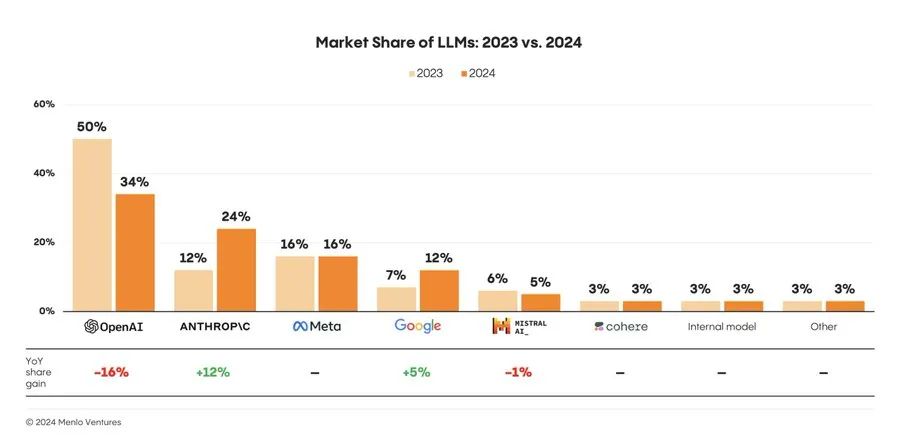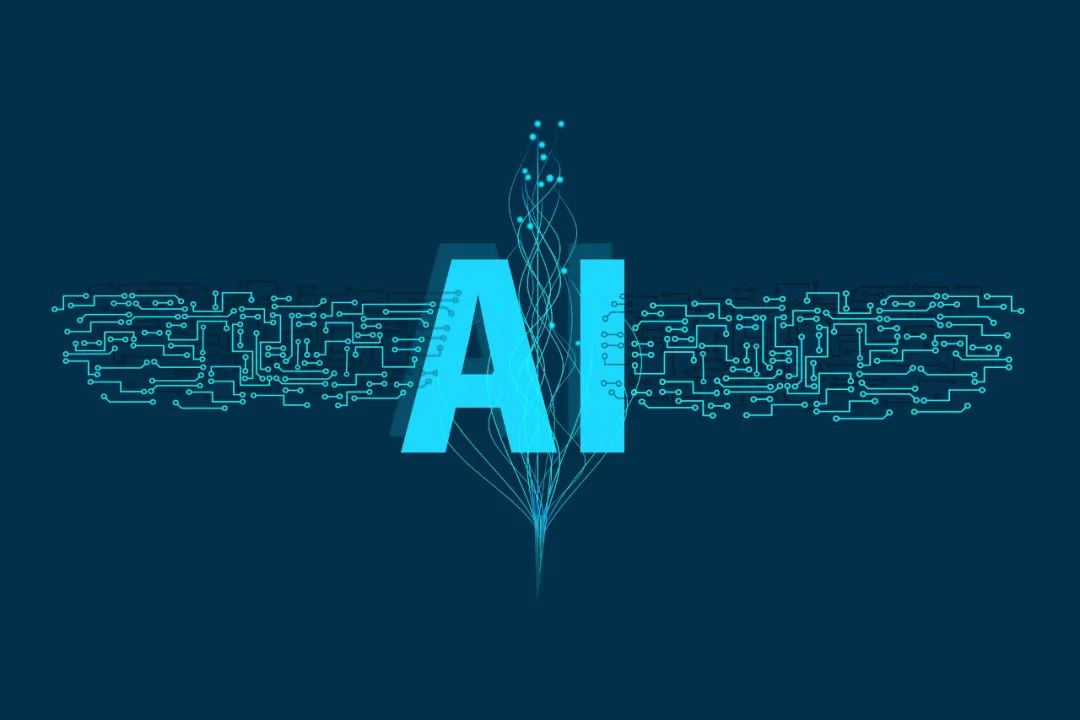AI arms race accelerates, Amazon invests $4 billion to back Anthropic
![]() 11/26 2024
11/26 2024
![]() 436
436
Editor's Note:
In the vast universe of artificial intelligence, an intense competition is quietly unfolding.
OpenAI, once a shining star in this field, now faces unprecedented challenges. A recent research report reveals that OpenAI's market share has plummeted from 50% to 34%, marking a shocking 16% drop. At the other end of this competition, Anthropic, an emerging force, is rapidly rising, with its market share soaring from 12% to 24%. With tech giant Amazon investing $4 billion and deepening its collaboration, Anthropic's advantage is expected to continue to widen, potentially reshaping the AI competitive landscape.
01
Continuous Investment
Amazon Demonstrates Its Commitment to AI Strategy
In September 2023, Amazon and Anthropic first announced a strategic partnership, with Amazon investing $4 billion in Anthropic and selecting it as its primary cloud service provider. This partnership garnered widespread attention in the industry at the time. A year later, Amazon made a second $4 billion investment, undoubtedly elevating this collaboration to new heights.
Anthropic is the company behind the Claude chatbot, which has quickly gained popularity alongside OpenAI's ChatGPT and Google's Gemini. Startups like Anthropic and OpenAI, as well as tech giants like Google, Amazon, Microsoft, and Meta, are engaged in an arms race for generative AI to ensure they do not lag behind in this market expected to surpass $1 trillion in revenue within the next decade.
Amazon's substantial investment is not only a recognition of Anthropic's technical prowess but also a vote of confidence in its future potential. With the rapid development of generative AI technology, more and more enterprises are realizing the importance of AI for business transformation and growth. Anthropic, with its Claude series models' excellent performance in terms of speed, safety, and privacy protection, has become the preferred partner for many enterprises.
Since the launch of the Claude model on Amazon Bedrock, it has quickly gained market recognition for its outstanding performance and wide range of application scenarios. Especially after the release of the Claude 3 and Claude 3.5 series models, Anthropic has repeatedly set new benchmarks for large language model performance. Among them, Claude 3.5 Sonnet recently upgraded its advanced agent capabilities, including "computer operation," outperforming all publicly available models in coding tasks.

The market has given positive feedback. The latest enterprise AI report shows that OpenAI's market share has plummeted by 16% over the past year. Anthropic, on the other hand, has seen its market share soar from 12% to 24%. This change not only reflects the pressure on OpenAI in market competition but also highlights the rise of competitors like Anthropic. As more enterprises explore the application of generative AI technology, their requirements for model performance, safety, and privacy protection are increasing. Anthropic, with its Claude models' outstanding performance in these areas, is gradually winning over the market.
It is worth mentioning that Anthropic also spares no effort in technological innovation. Through close cooperation with partners like Amazon, Anthropic continuously pushes for the upgrade and optimization of the Claude model. In the future, with the deepening of cooperation between the two parties, the Claude model is expected to achieve breakthroughs in more fields, providing stronger support for enterprises' digital transformation and intelligent upgrading.
02
Deep Collaboration
Reshaping the Future AI Landscape
According to Anthropic, a San Francisco-based company that launched the Claude chatbot and AI models, the new funds bring the tech giant's total investment to $8 billion. Additionally, Amazon Web Services (AWS) will become Anthropic's "primary cloud and training partner," which, in my understanding, means that Anthropic will use AWS Trainium and Inferentia chips to train and deploy its largest AI models from now on.
Matt Garman, CEO of Amazon Web Services, said, "Customers who develop generative AI applications on Amazon Bedrock using Anthropic's foundational models have provided positive feedback. We look forward to deepening our collaboration with Anthropic."

Meanwhile, Amazon Bedrock will provide customers running Claude models with superior performance, safety, and privacy protection. Furthermore, the two partners will jointly offer early access to AWS customers, enabling them to fine-tune Anthropic models using their own data. This customized feature will allow AWS customers exclusive access to new Claude models for a period.
Dario Amodei, co-founder and CEO of Anthropic, noted, "Our collaboration with Amazon is crucial, enabling the Claude model to reach millions of end-users across tens of thousands of customers on Amazon Bedrock."
With the deepening of their partnership, Anthropic will continue to use AWS as its primary cloud service provider and now designates AWS as its primary partner for model training, planning to use Amazon Trainium and Amazon Inferentia chips to train and deploy future foundational models. The two parties will continue to work closely to enhance the hardware and software capabilities of Amazon Trainium.
Amazon's investment in Anthropic has undoubtedly played a crucial role in the latter's rise. As one of the world's leading technology enterprises, Amazon has deep accumulations and rich experience in the field of artificial intelligence. Through its collaboration with Anthropic, Amazon not only provides strong financial support and resources but also brings advanced technology and platform support.
Firstly, in terms of financial support, Amazon's investment in Anthropic is unprecedented. The importance Amazon places on Anthropic is evident. These funds not only provide a solid foundation for Anthropic's research and development and innovation but also lay a solid foundation for its market expansion and competition.
Secondly, in terms of technological and platform support, Amazon has also provided great assistance to Anthropic. As a leader in cloud computing, Amazon possesses the world's most advanced cloud computing platform and rich technical resources. Through its collaboration with Anthropic, Amazon shares these resources and technologies, enabling Anthropic to train and deploy AI models more efficiently. At the same time, Amazon also provides customers with early access to Anthropic's features and technologies, further expanding Anthropic's market influence and user base.
Investing in Anthropic is also an important move by Amazon to compete with other rivals in the AI arms race. In the current AI market landscape, Microsoft's close collaboration with OpenAI has given it a head start in AI applications and cloud service integration, while Google is continuously increasing its investment in AI research and development and launching a series of innovative products. By supporting Anthropic, Amazon is laying a solid foundation for its long-term development in the AI field.
For Amazon, investing heavily in Anthropic is a significant strategic layout for the future.
03
Conclusion
Amazon's substantial investment in Anthropic will undoubtedly stir up waves in the AI industry, bringing about profound changes.
Firstly, it will intensify competition in the AI field, driving leading technology enterprises to increase investment in AI technology research and development, talent acquisition, and market expansion. The AI market will become more diverse and fiercely competitive, spurring a series of technological innovations and new business models.
Secondly, this round of investment may lead to the restructuring of strategic partnerships and the formation of alliances within the AI industry. To maintain competitive advantages, other technology enterprises may seek collaborations with Anthropic or other emerging AI forces or strengthen their in-house R&D teams to build new technological cooperation systems.
Finally, this investment initiative will accelerate the penetration and application of AI technology across various industries. As competition in the AI field intensifies, enterprises will more actively explore ways to integrate AI technology into their businesses, aiming to enhance production efficiency, optimize product and service quality, and reduce operational costs, thereby promoting the digitization and intelligence of society as a whole.
This is undoubtedly a great thing.







